
The United Arab Emirates (UAE) is known for its luxurious lifestyle, tall skyscrapers, and vast deserts. But over the last few years, the country has also started gaining attention for something very different — its commitment to sustainability and green development.
From solar-powered cities to eco-friendly transport systems, the UAE is moving fast toward a future that balances progress with planet care. This shift is not only improving life for residents but also putting the UAE on the map as a global leader in sustainable living.

Climate change is a serious issue worldwide, and the UAE is no exception. The country faces high temperatures, limited freshwater, and a growing population. This puts pressure on natural resources and increases pollution. Recognizing these challenges, UAE leaders have taken strong action.
In 2017, the UAE launched the UAE Energy Strategy 2050, aiming to increase the share of clean energy to 50% of the total energy mix and reduce the carbon footprint by 70%. The government has also committed to achieving net-zero emissions by 2050.
These ambitious goals are now turning into real action across the country.

One of the most well-known examples of sustainable development in the UAE is Masdar City, located near Abu Dhabi. This city is designed to run almost entirely on renewable energy. Solar panels power homes and offices, and electric vehicles are used for transport.
Buildings in Masdar City are constructed to reduce energy and water use. Even the layout of the city is designed to stay cooler naturally, cutting down the need for air conditioning.
Masdar City is not just a place to live and work — it’s also a research hub where scientists and innovators work on the latest green technologies.
Dubai, the UAE’s most populous city, is also taking major steps toward sustainability. One of its biggest projects is the Dubai Clean Energy Strategy 2050, which aims to make Dubai a global hub for clean energy and green economy.
The city is building the Mohammed bin Rashid Al Maktoum Solar Park, which will be one of the largest solar parks in the world. By 2030, this park is expected to produce 5,000 megawatts of electricity, enough to power millions of homes.
Dubai has also launched Green Building Regulations that require new buildings to meet eco-friendly standards. There are also more green spaces and parks being developed across the city to improve air quality and quality of life.

Another important area of development is sustainable transportation. In cities like Dubai and Abu Dhabi, the public transport system is expanding to reduce car use and lower pollution.
Dubai’s Metro is already one of the most advanced driverless train systems in the world, and it runs entirely on electricity. The city has also introduced electric buses and aims to have 25% of all transportation trips be smart and driverless by 2030.
Electric vehicles (EVs) are becoming more popular too. The government offers incentives for EV buyers and is expanding the network of charging stations across the country.
The UAE is also working to make its tourism industry more sustainable. Eco-resorts like Al Maha Desert Resort and Hatta Damani Lodges offer visitors a way to enjoy nature without harming it. These places use solar energy, recycle water, and aim to protect the local wildlife.
At the same time, campaigns like “Clean UAE” encourage both tourists and residents to keep beaches and deserts clean.
Expo 2020 Dubai, which took place from October 2021 to March 2022, was a key example of sustainable event planning. The event site, now called Expo City Dubai, is being transformed into a green urban district with smart energy solutions, walkable spaces, and zero-waste goals.
One of the reasons for the success of sustainable development in the UAE is the strong partnership between the government and private companies. Real estate developers like Emaar and Aldar are building green communities with energy-efficient homes, solar panels, and waste-reduction systems.
Banks are also offering green finance options to support eco-friendly building projects. This helps make sustainability not just good for the environment, but also good for business.
While the progress is impressive, challenges remain. The UAE still depends heavily on oil and natural gas. Water scarcity continues to be a major issue, and extreme heat can make some green projects harder to maintain.
However, the commitment from the top levels of government and the growing awareness among the population offer hope. Education campaigns, school programs, and public awareness initiatives are helping people understand why living green is everyone’s responsibility.
The UAE is proving that rapid development and sustainability can go hand in hand. With continued investments in renewable energy, eco-friendly infrastructure, and smart technology, the country is building a future where both people and the planet can thrive.
By focusing on innovation, policy, and public engagement, the UAE is not just planning for a green future — it’s already living it.
As more countries look for ways to deal with climate change, the UAE’s experience offers valuable lessons. It shows that even in a desert nation, sustainable living is not just possible — it can lead the way.
Read More:- Shobha Realty Launches Its Most Luxurious Project Yet—Full Details Inside 2025
